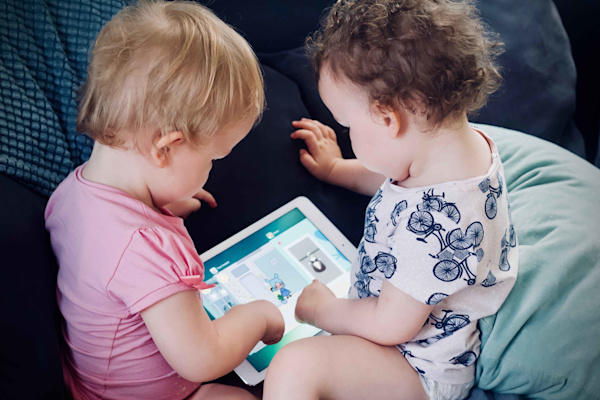
How Screen Time Could Harm Your Preschooler's Development
Smart Devices in Little Hands
In the age of technology, mobile devices have become as common as toys in the hands of our children. However, it’s worth asking ourselves: Could these glowing screens be impeding their development?
A startling study titled "Brzdąc w sieci” (PL Title- Loosely translated as “Toddler on the web”) sheds light on how overusing digital devices may have far-reaching consequences for children's early development. [1][2]
Let's take a look at what researchers from the Academy of Special Pedagogy (Akademii Pedagogiki Specjalnej) (APS) in Warsaw have discovered.
A Closer Look at the Modern Childhood Dilemma
The research team, led by psychologist Dr. Magdalena Rowicka, focused on the impact of mobile devices on children aged 4-6.
"Our greatest concern is understanding if using these devices, before starting school, has negative consequences, a fear many of us share," said Dr. Rowicka.
Negative Consequences: More Than Just a Glitch
The negative effects of too much screen time aren't new; they range from poorer language skills to memory issues, self-control problems, and even mental health concerns.
This particular study, however, explored how screen time could affect executive function in preschoolers.
"Preschool is a crucial period for children to engage in physical activities like running and jumping, hands-on experiences like molding with modeling clay or other modeling compounds, and social interaction with peers," Dr. Rowicka emphasized. The study found that excessive technology use might lead to problems with memorization, controlling emotions, and creativity over time.
The Fine Line: Cartoons Good, Apps Bad?
Interestingly, the study suggests that age-appropriate movies or cartoons may not be as harmful as digital apps on phones or tablets. The reason might lie in the fact that movies and cartoons have been carefully crafted over time to fit the developmental needs of children. Apps, being relatively new, may not yet meet the same standards and often lack educational value.
"The child may excel in an app, receiving constant positive feedback, but true learning involves reflection, analysis, and making mistakes," Dr. Rowicka explained. This distinction points to an urgent need for collaboration between educators and specialists to make digital content more developmentally appropriate.
Understanding the Different Profiles of Users
The research team identified two main groups of children in their study: those who function very well and those who struggle. Among these, 42% were high-functioning, making few mistakes, while 20% performed tasks quickly, but with many errors.
A significant finding was that the children who were inattentive and quick to finish tasks—those who made many mistakes—spent the most time using digital technology in the form of tablets. Such children were likely using apps that were too easy, reinforcing the notion that speed equals success.
Parents' Habits, Children's Challenges
The children's problems didn't stand alone. The researchers noted that parents of struggling children tended to watch more TV and use social media, modeling behavior that their children would likely imitate.
Moderation and Supervision: A Balanced Approach
Dr. Rowicka reassured that occasional use of digital devices is not harmful. "Let's not be afraid to hand a child a phone or tablet now and then, as moderation is key," she advised. Parents should also take an active role by watching content with their children and discussing it, as a lack of supervision can lead to lower functioning in the future.
A Digital Dilemma with Real-world Impact
The study, which involved 744 children and an equal number of parents, used surveys, questionnaires, and tests to paint a comprehensive picture of modern childhood.
With an average parent age of 33.83 years and a predominance of female respondents (87.8%), the research presents a timely warning about the effects of technology on our children.
In a world where digital devices are omnipresent, striking a balance between technology and traditional developmental activities is essential.
This study serves as a critical reminder for parents and educators alike to be mindful of the time our little ones spend with their electronic companions.
The path to a healthy and balanced childhood may very well lie in our own hands—and our children's screens.
Related stories

Why Mudita Kompakt Might Be the Best Minimalist Phone of 2025
Mudita Kompakt stands out in the expanding minimalist tech market may be the best minimalist phone of 2025 helping you reclaim your time and focus.

Why a Mudita Alarm Clock is The Most Sought-After Gift Of 2024?
Give the gift of better mornings! Discover why a mindful alarm clock is the perfect holiday present - practical, stylish, and designed for healthier sleep.

How to Sleep Better When Anxiety Keeps You Awake
Struggling to sleep with anxiety? Discover mindful tips, natural remedies & practical strategies to calm your mind, improve sleep quality & wake up refreshed.
If you'd like to receive the best stories from our blog, keep up to date with our progress and get notified about our product releases and special discounts.